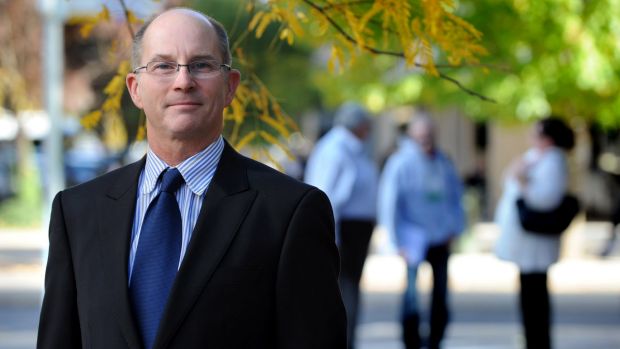
The ACT’s chief health officer Paul Kelly is pleased with the uptake of immunisation in the state. Photo: Elesa Kurtz
The ACT continues to have the highest immunisation rate in Australia for children aged between one and five years, despite a growing number of parents objecting to vaccinations.
According to the Australian Childhood Immunisation Register, the number of ACT parents refusing to immunise their children because of a “conscientious objection” has increased by 35 per cent since March 2012.
At least one student on the south coast was diagnosed with German measles this week, with the principal of Batemans Bay Public School alerting parents that the school had “suspected cases” of mumps.
A recent outbreak of measles in the United States that was traced to Disneyland has also reignited a political debate about the necessity for vaccinations, drawing comments from presidential candidates.
ACT Medicare Local chairman Martin Liedvogel said Canberra was not immune to the anti-vaccination debate and urged parents to vaccinate their children as they head back to school.
“I think everybody has their own reasons and there are not really that many people who are objecting in the ACT, with immunisation rates over 90 per cent – the highest in Australia,” he said.
“People will have to make their own decisions but things become blurred when spokespeople on social media start spreading the message not to immunise.
“There’s no issue with people voicing their own opinions but, if you start voicing those opinions in a public forum, then you need to have some scientific evidence to back that up.”
The latest figures show 93.1 per cent of ACT children aged between 12 and 15 months were fully immunised compared to 91 per cent of children aged between 24 and 27 months.
“We need to continue to have public education about the importance of immunisation and to put a voice forward to counter people on social media who say immunisation is something to be avoiding, along with supporting GPs and improving services,” Dr Liedvogel said.
“We enjoy high rates of vaccination in the ACT and would like for this to continue.”
Chief health officer Paul Kelly said there would always be people who object to immunisation, either on religious grounds or for other reasons.
Mr Kelly said it was important to concentrate on those who often to forget to immunise their children because they have busy lifestyles rather than those who are simply opposed to vaccination.
Erin Schrieber, an Oxley mother with a one-year-old son, said she hadn’t met many mothers who hadn’t immunised their children, with even the more “crunchy” or “hippy” mothers agreeing immunisations were not negotiable.
“I think attitudes are slowly changing, so that those who might have once believed that vaccinations were unnecessary or some sort of big pharmaceutical marketing ploy or other conspiracy theories are moving on from that point of view,” she said.
“I think choice is still important, but … misconceptions around vaccination such as links to autism need to be challenged.
Mr Kelly said he was “very proud” of the ACT’s immunisation record and attributed the success to collaboration with GPs and an educated population.
“We do have a well-educated community and the vast majority of people are very aware of how important and effective immunisation is,” he said.
“We’ve got a very good process of delivering the vaccination program which is a collaborative effort between ACT Health and our hospitals, clinics, and general practitioners.”
Dr Liedvogel was also quick to praise the collaborative work of health professionals in the ACT.
“The team of Canberra GPs, practice nurses, and maternal and child health nurses has worked hard to achieve this outstanding overall immunisation result for the ACT,” he said. “General practice provided almost half of all immunisations by families using their local practice as their patient-centred medical home.”
